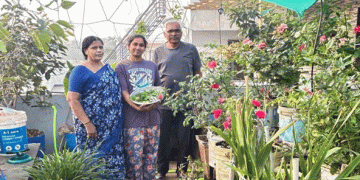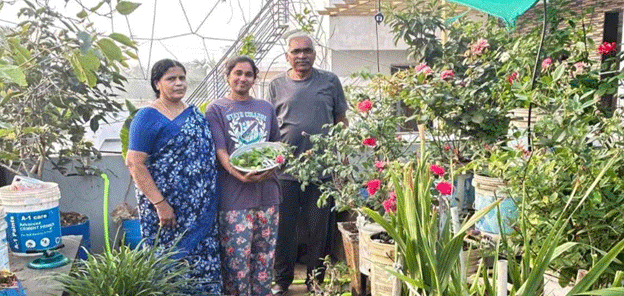In the heart of Hyderabad, Ashok Rao, a 68-year-old retired banker, has turned his 2,000-square-foot rooftop into a flourishing organic garden. What began as a pandemic pastime has now become a self-sustaining source of fresh produce, yielding over 200 plants—from tomatoes, coriander, and drumsticks to mangoes, figs, and pomegranates. His story is not just inspiring but also a testament to the potential of urban agriculture in addressing food security and sustainability.
The Rise of Urban Farming: A Global Trend
Ashok’s success mirrors a growing global movement toward urban agriculture. According to the Food and Agriculture Organization (FAO), urban farming can supply up to 15-20% of the world’s food and significantly reduce carbon footprints by cutting transportation emissions. A 2023 study by the World Economic Forum highlighted that rooftop gardens can lower urban temperatures by 2-3°C, combatting the heat island effect while improving air quality.
Organic Practices for Higher Yields
Ashok’s organic techniques—vermicomposting, neem oil sprays, and cow urine solutions—align with research showing that natural farming methods increase soil fertility by 30% compared to chemical-dependent agriculture (Journal of Sustainable Agriculture, 2022). His homemade compost, made from kitchen waste and cow dung, follows the principles of circular economy farming, reducing waste while enhancing productivity.
Health and Economic Benefits
Ashok’s garden eliminates his dependence on market-bought vegetables, a crucial advantage given rising food inflation (India’s vegetable prices surged by 37% in 2023, as per RBI reports). Moreover, his diabetes-friendly diet, rich in homegrown salads, underscores the health benefits of chemical-free produce. Studies from the Organic Farming Research Foundation (2024) confirm that organic vegetables contain up to 60% more antioxidants than conventionally grown ones.
A Blueprint for Future Farmers
Ashok Rao’s journey proves that sustainable agriculture is viable even in urban spaces. For farmers and agronomists, his methods offer scalable solutions—whether through terrace farming, organic composting, or natural pest control. As climate change and food insecurity loom, such innovations could redefine modern farming.































